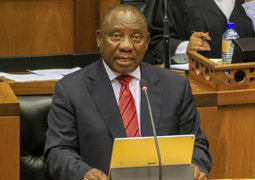
The President delivered his budget vote debate yesterday and thereafter it was debated by various parties in the House who raised their concerns on what he deliberated on in his speech.
Reacting to some of the criticism levelled against him yesterday, he maintained that white privilege and black poverty is not something of the past, it is the issue that confronts our country in the present.
We, therefore, cannot build a united country without addressing the material realities that are racially skewed, he said. “We achieved reconciliation, now we need to tear down the barriers that divide us. And these barriers are barriers not of today but of our past.”
We also have to tear down the barriers that exist in our minds, especially of those who think it is acceptable to sing Die Stem – a symbol of discrimination and misery, he said. “Those who do so must be mindful of the fact that apartheid was a crime against humanity.”
As such, we have to desist from measuring one’s worth based on their race, gender, class or income, or based on the landscape they occupy – be it in urban, rural, homelands, cities or towns, he said.
The President said the notion of a united nation is not about tearing down racial barriers and reconciliation between black and white, but should also foster gender equality. “Attention needs to paid to the representation of women in our public sector and state procurement processes.”
But most significantly, we should prioritise the education of the girl child, he said. “As government we should remove the impediments that hinder the girl child from completing schooling. We should ensure that they advance to attain higher education qualifications.”
To mark the Take a Girl Child to Work Today, the President said the country should ensure that the girl child reaches her dream. “If the girl child dreams of becoming an MP (Member of Parliament), she must dream that dream and ensure that they become better MPs than all of us.”
Much of our aspirations as a country revolve on our ability to attract investment to grow our economy and its social prospects, he said. Responding to criticism levelled against his investment drive, he stated that the current government investment drive is not at all a class project. “If we were to address the imbalances that exist in our country, we have to create jobs to lift many of our people out of poverty, and to achieve that we have to attract investment.”
This initiative has galvanised the CEOs of leading companies in this country who have pledged that they will, in the next five years, contribute R420 billion into our economy, he said.
Research has shown that the countries that succeed are those that attract local and foreign investment, he said. “This would help us to correct the distortions of apartheid. It can assist in reducing skills deficiency and provide people with assets to break the cycle of poverty that is passed from one generation to the other.”
Land reform can be a catalyst in breaking this circle, he said. “If land is restricted to the minority of our population we will never realise its contribution to our economy.”
With regard to land reform, we have no choice because it is our historic duty and responsibility to address the land issue even through expropriation without compensation, he said. “Expropriation without compensation is not an end, but a means to an end. And it will be done in a sustainable way.”
In so doing, we are willing to engage and find consensus and we are not going to compromise but to ensure that the land question is resolved once and for all, he said.
But to ensure that the government’s budget is utilised effectively, there should be an integrated planning and political will to make the right choices to improve the efficiency and effectiveness of government.
Tied to this is the need to react to the Auditor-General’s report that there is a regress in the audit outcomes of many of our municipalities, he said. “The Department of Cooperative Governance and Traditional Affairs has resolved to ensure that the three of five pillars of back to basics programme to ensure there is an effective administrative capacity, good governance and sound financial management.”
From all the contributions made in this House yesterday, it is clear that we have entered a new era of growth and transformation, he said. “We are all South Africans and we have a common responsibility and we have to put aside our narrow interests to work together to achieve the goals of the shared future that our people desire.”
By Abel Mputing
24 May 2018

